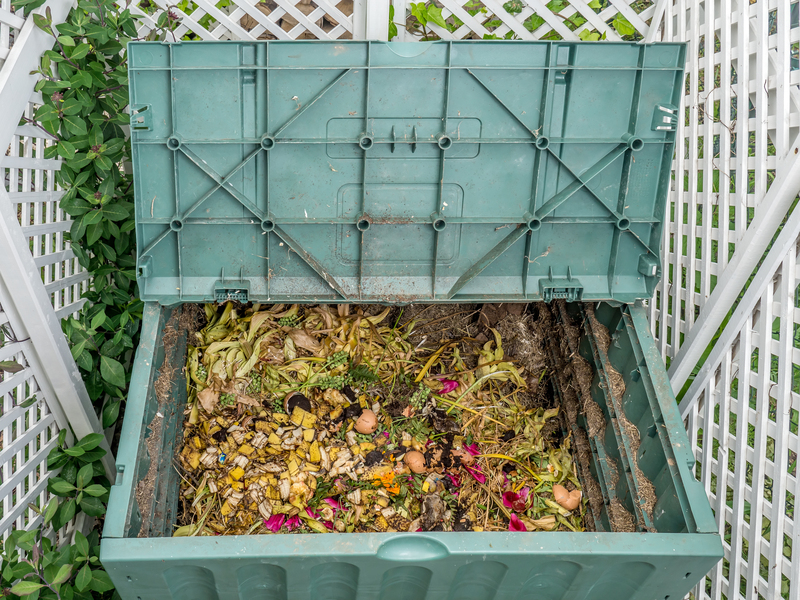Smart Solutions for Cost-Effective Bulky Waste Disposal
Struggling with mountains of old furniture, appliances, or construction debris? Discover how modern, smart solutions can make cost-effective bulky waste disposal both easy and environmentally friendly.

Introduction to Bulky Waste Disposal Challenges
Bulky waste--also known as large item waste--refers to materials too large to fit in regular garbage bins, such as furniture, mattresses, white goods (like fridges and washing machines), electronic waste, and large yard debris. As urban populations grow and the demand for new goods increases, the volume of bulky waste escalates. Not only does this pose logistical headaches, but improper handling can also harm the environment and inflate costs for homeowners and businesses alike.
Finding cost-effective bulky waste disposal methods demonstrates environmental responsibility and can also save you significant amounts of money. In this article, we'll explore smart solutions that streamline the bulky waste disposal process, making it more efficient, affordable, and sustainable.
Understanding Bulky Waste: What Is It?
Bulky waste typically consists of any household or commercial waste items that are too large for standard trash collection. Examples include:
- Furniture (sofas, wardrobes, tables, chairs)
- Appliances (refrigerators, washing machines, ovens, air conditioners)
- Mattresses and bedding
- Large yard waste (branches, stumps, gardening equipment)
- Electronic waste (TVs, computers, monitors)
The disposal of these items is often complicated by their size, weight, and the materials from which they are made--many of which cannot go to a landfill or require special handling.
Why Cost-Effective Bulky Waste Disposal Matters
Disposing of large, unwanted items can be expensive, especially if landfill fees, vehicle hire, and environmental compliance costs are factored in. Smart and budget-friendly disposal strategies help by:
- Reducing landfill waste, which minimizes environmental impact
- Saving money through reuse, donation, or recycling initiatives
- Complying with local regulations without the risk of fines
- Improving community aesthetics and property value
Smart Solutions for Bulky Waste Disposal
Technology and creativity can transform the cumbersome task of getting rid of bulky items. Here are some smart solutions for affordable and effective bulky waste management:
1. Online Marketplace Platforms
Digital platforms such as Facebook Marketplace, Craigslist, and local "Buy Nothing" groups can be excellent avenues for getting rid of bulky items at little to no cost. Simply post your item with photos and a brief description, and you may find someone happy to haul it away--sometimes even for reuse or upcycling.
- Advantages: Reach wide audiences, encourage reuse, no disposal fees
- Tip: Be honest about item condition and offer for free to expedite pickup
2. Community Bulky Waste Collection Events
Many municipalities organize periodic bulky waste pickup days. Residents can schedule pickups or bring items to a designated drop-off location. These services are often subsidized or free, making them a cost-effective bulky waste disposal option.
- How to Benefit: Stay informed about local collection schedules and eligibility requirements
- Bonus: Some events include e-waste, hazardous materials, or shredding services
3. Donation and Reuse Networks
Charities and social enterprises often accept gently used furniture and appliances. Organizations like Habitat for Humanity ReStores, the Salvation Army, and local shelters may even provide free pickup services.
- Advantages: Reduces landfill load, helps communities, tax-deductible receipts
- Note: Only donate items that are clean and in working condition
4. Hire a Responsible Junk Removal Service
If self-disposal isn't practical, smart consumers look to licensed and insured junk removal companies. Many firms offer competitive bulk rates for larger items and will sort for recycling or donation first, reducing costs and environmental impact.
- Smart Tip: Get quotes from several companies and ask about green disposal policies
- Benefit: They do all the heavy lifting and know how to handle hazardous components safely
5. Rent a Roll-Off Dumpster or Skip
For major clear-outs, renovations, or construction jobs, a temporary roll-off dumpster or skip is a smart and cost-efficient bulky waste management choice. Sizes can be tailored to your needs, and you pay only for the space used.
- Advantage: Convenient and flexible for ongoing projects
- Cost-saving tip: Share with neighbors or coordinate pickups to split fees
6. Leverage Smart Bulky Waste Apps
The rise of mobile apps and online booking systems has made arranging bulky waste pickup easier than ever. Municipalities and private services offer platforms where you can schedule collections, track recycling, and learn about responsible disposal methods.
- Features: Real-time scheduling, digital receipts, reminders, resources for recycling
- Why it's smart: Less paperwork, simplified logistics, and eco-friendly tips
7. Upcycling and Repurposing Projects
A creative--and ultra cost-effective--approach is upcycling. Old doors become coffee tables, pallets become garden beds, and several pieces can be repainted or reupholstered for new use. This reduces disposal needs and breathing new life into old items.
- Community idea: Host neighborhood upcycling workshops
- Benefit: Saves money and reduces landfill usage
How to Reduce Bulky Waste at the Source
The smartest--and most cost-effective--strategy is minimizing bulky waste from the outset. Consider these proactive steps:
- Buy durable, high-quality furniture and appliances that won't need frequent replacement
- Rent or borrow rarely used items instead of purchasing
- Repair and maintain existing items to extend their lifespan
- Embrace minimalist living to reduce consumption overall
Smart Bulky Waste Disposal for Businesses
Businesses, retailers, and property managers also generate significant large-item waste. Here are cost-saving strategies tailored for commercial needs:
- Partnering with recycling or materials recovery facilities (MRFs): Many materials, including metals, plastics, and wood, can be repurposed or sold
- Implementing inventory control and item repair programs: Reduces volume sent for disposal
- Cooperating with local non-profits: Office furniture or electronics can support schools or charities
- Working with logistics companies: Smart tracking ensures efficient pickup and minimized costs
Environmental and Legal Considerations
Improper disposal of bulky waste is not only costly but may be illegal and environmentally damaging. Here's why compliance and sustainability matter:
- Regulations: Many regions require specific disposal methods for electronics, appliances, and hazardous materials--violations can mean hefty fines
- Environmental impact: Bulky waste often contains components (like refrigerants, metals, or chemicals) that must be managed carefully to prevent pollution
- Corporate responsibility: Businesses are increasingly expected to demonstrate green practices, boosting reputation and client trust
How Technology Drives Smart and Efficient Waste Disposal
The digital age has dramatically improved the way we tackle large-item waste. Types of smart waste technology now include:
- IoT-enabled waste bins: Sensors report fill levels for optimized collection routing
- GPS fleet tracking: Reduces mileage and labor costs for bulk item pickups
- Automated sorting at recycling facilities: Increases recovery rates and cuts landfill expenses
- AI-powered materials recognition: Ensures hazardous and recyclable items are diverted properly
Case Study: Citywide Smart Bulky Item Collection
Major urban centers like San Francisco and London have implemented smart scheduling systems for bulky waste. These platforms let residents book collection slots online, track pickup status, and receive recycling tips--all of which reduce costs for both the municipality and the public.
Tips for Cost-Effective Bulky Waste Disposal
To sum up, here are some quick tips on affordable bulky waste disposal:
- Plan ahead: Prepare items before scheduled pickup days or events
- Consolidate loads: Combine bulky items with neighbors or during other disposal events
- Leverage tax credits: Donated items may yield deductions
- Educate yourself: Learn local rules and recycling options for specific item types
- Use reputable providers: Choose licensed, green-certified disposal services
The Future of Bulky Waste Management: Smart, Sustainable, and Affordable
As environmental awareness grows and digital solutions multiply, the future of bulky waste disposal is undoubtedly smarter, more sustainable, and more cost-effective. With the right mix of technology, community action, and responsible habits, both households and businesses can minimize their carbon footprint, save considerable amounts of money, and support a circular economy.
Remember: Each piece of bulky waste diverted from landfill is a win for your wallet and for the planet. By adopting smart, tech-enabled, and community-based approaches, you'll make bulky waste disposal simpler and far more cost-effective than traditional methods.

Frequently Asked Questions on Smart Bulky Waste Solutions
What is the cheapest way to dispose of bulky waste?
The most cost-effective methods include reuse or donation (via charities or online groups), participating in municipal collection events, and recycling via specialized drop-off centers. Selling or giving away items through online marketplaces is also a free option.
Are junk removal services worth the cost?
For those unable or unwilling to move items themselves or with limited time, junk removal services offer convenience and ensure legal, responsible disposal. Costs are justified by efficiency, safety, and minimizing environmental harm.
How do I know if my bulky item can be recycled?
Check with your local recycling authority or use smart bulky waste apps to find out which items are accepted. Many appliances, metals, and electronics can be recycled, while some materials (like mattresses) may require special facilities.
What is upcycling, and how does it reduce bulky waste?
Upcycling is creatively repurposing waste items into new, useful products--like turning old furniture into garden planters or art. This keeps bulky goods out of landfills, saves money, and supports sustainable living.
Conclusion: Take Action with Smart Bulky Waste Disposal
With innovative technology, community programs, and a focus on cost-effective bulky waste solutions, it's easier than ever to dispose of large, unwanted items responsibly. Whether you are a household, business, or property manager, adopting smart disposal strategies saves money, time, and the environment.
Start by evaluating your disposal needs, exploring digital and community resources, and committing to sustainable practices. The smartest solutions are those that benefit everyone--your neighborhood, your wallet, and the planet.
Make bulky waste disposal smarter, greener, and more affordable--today.
